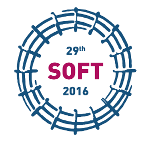Speaker
Ulrich Neuner
(Max-Planck-Institut für Plasmaphysik)
Description
Thirteen Rogowski coils have been installed in the vacuum vessel of the stellarator Wendelstein 7-X (W 7-X). They are designed to measure the equilibrium plasma currents as Pfirsch-Schlüter current and bootstrap current. The coils will be calibrated using a conductor positioned inside the plasma vessel with an alternating current passing through it. The response of the coils is measured and compared to calculations. To reduce effects caused by the (frequency-dependent) induced currents in the vessel wall, the calibration will be done at alternating current frequencies up to 1 kHz.
This paper reports on a multi-purpose design that combines a rail system for the neutron calibration with the conductor for the calibration of the Rogowski coils. The rail system is needed to carry a neutron source for the calibration of the neutron counters. The actual rail system is designed in such a way that it can be additionally used for running the calibration current for the Rogowski coils.
While this works well for the continuous Rogowski coils where only the total current needs to be known, the segmented Rogowski coils need more care since they are designed to measure current density distributions. It is foreseen to install an additional calibration unit with a dedicated multi-loop setup.
Co-authors
Henning Thomsen
(Max-Planck-Institut für Plasmaphysik, Greifswald, Germany)
Kian Rahbarnia
(Max-Planck-Institut für Plasmaphysik, Greifswald, Germany)
Michael Endler
(Max-Planck-Institut für Plasmaphysik, Greifswald, Germany)
Thomas Klinger
(Max-Planck-Institut für Plasmaphysik, Greifswald, Germany)
Ulrich Neuner
(Max-Planck-Institut für Plasmaphysik, Greifswald, Germany)

